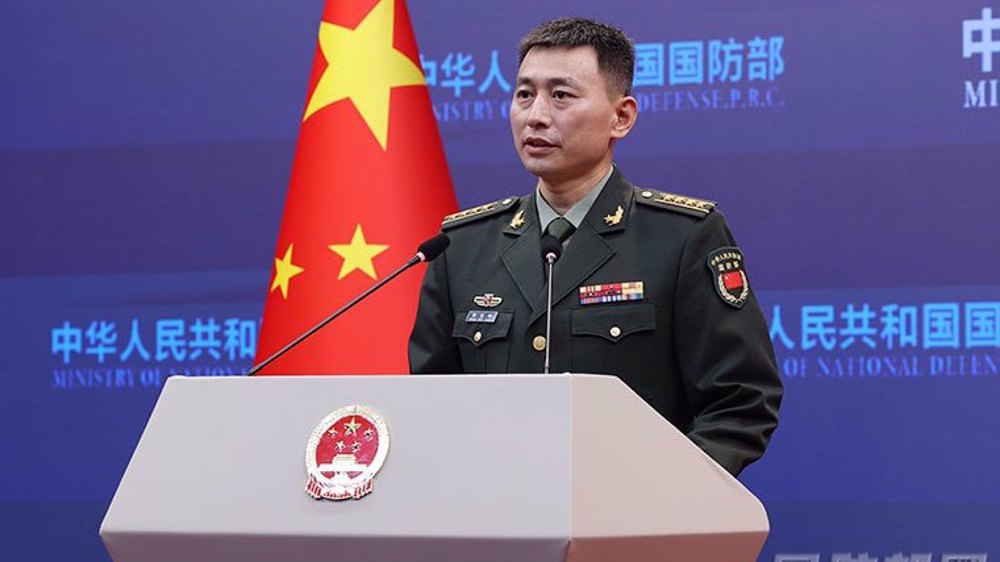FT report on replacing Hong Kong leader political rumor: China
China has dismissed a recent report that the government in Beijing is putting together a plan to tackle the situation in crisis-ridden Hong Kong by replacing the city's leader, describing it as nothing but a “political rumor” with ulterior motives.
Citing people briefed on the plan, the Financial Times reported Tuesday that Beijing was working to substitute Chief Executive Carrie Lam, but that it favored a stabilized situation before attempting to do so.
However, Chinese Foreign Ministry Spokeswoman Hua Chunying rejected the report as being fallacious and politically motivated, during her daily news briefing on Wednesday.
The semi-autonomous Chinese territory has been rocked by a spate of turbulent street protests since June, when people outraged by a proposed extradition bill descended on the districts across the city. The bill was later withdrawn, but the protests continued and took on an increasingly violent form.
According to the FT report, Chinese President Xi Jinping might eventually decide to appoint Lam's successor by March, who will then serve an interim leader for the remainder of her term until 2022.
There has been speculation as to who the leading candidates for the replacement are. Top on the list are the former head of the Hong Kong Monetary Authority Norman Chan, and Henry Tang, who has also served as the territory's financial secretary and chief secretary for administration, the paper wrote.
However, a senior Chinese official explained that none of the suggested candidates could possibly take over from Lam based on the territory’s Basic Law.
Under the law, if the chief executive is unable to discharge his or her duties, they will be temporarily assumed by the Administrative Secretary, Financial Secretary or Secretary of Justice in that order, the official said.
That would mean that if Lam resigns, her responsibility would be handed to Chief Secretary for Administration Matthew Cheung, who can act as chief executive for as long as six months. Before that interim period ends, the city’s 1,200-member Election Committee must meet to select a new leader.
Back in July, FT reported that Lam had offered to step down, but that the Chinese government had refused to accept her resignation.
Later, Beijing and the Hong Kong government denied any intentions on the part of Lam to resign from her post.
Hong Kong formally withdraws extradition bill
In another related development, the legislature in Hong Kong formally withdrew the extradition bill on Wednesday.
Despite recurrent assurances by Lam that the bill was as good as dead, the protesters kept insisting that it be officially withdrawn.
But it has to be seen whether or not the announcement would manage to appease the protesters, who have all along called for their five main demands to be met.
For one thing, they want Lam to step down and for another, they are seeking an independent inquiry into what they describe as a brutal security crackdown on protests. They are also calling for amnesty for all those charged with rioting.
Hong Kong releases murder suspect
Speculation over Lam's replacement came as her government released a murder suspect, whose case prompted the government to propose the bill in June to allow the extradition of suspects to Taiwan, Macau, as well as mainland China.
Millions of people initially flooded the streets to show their opposition to the bill. Eventually the proposal was withdrawn, but the protests morphed into an anti-government campaign which gradually became large in scale and more violent in nature, with masked individuals vandalizing public and private property and attacking government buildings.
Hong Kong authorities released Chan Tong-kai on Wednesday morning after 18 months in prison. They rejected a request from Taiwan to send law enforcement to escort the suspect back to Taiwan, from where he had escaped after allegedly killing a pregnant woman.
Officials in Hong Kong said Taiwan’s offer was “disrespectful” to Hong Kong’s jurisdictional power and “totally unacceptable.”
Chan is wanted in Taiwan over murder charges. But the two sides do not have an extradition agreement and this case was partially what prompted the government in Hong Kong to propose the extradition bill, which if endorsed, would have allowed the extradition of criminal suspects to China, Taiwan and Macau.
But the opponents argued that it could result in unfair trials in mainland China.

Upon leaving the prison, where he served term on money laundering charges, Chan apologized to the victim's family and the Hong Kongers and said he decided to surrender to police in Taiwan.
The Lam government denies having coerced Chan into surrendering to Taiwan, saying his decision was “purely out of his own free will.”
Hong Kong has been governed under a “one-country, two-system” model since the city — a former British colony — was returned to China in 1997.
The Chinese government says the United States and Britain have been fanning the flames of unrest in Hong Kong by supporting the protesters.
‘Clock ticking’: UNRWA slams unjustifiable killing of children in Gaza
BP to be sued in Britain for supplying oil to Israel
VIDEO | Press TV's news headlines
Israeli strikes on north Gaza hospital ‘extremely dangerous, terrifying’: Director
VIDEO | Yemen targets Tel Aviv with Palestine 2 missiles
Pezeshkian: Iran resolved to complete North-South Transport Corridor
VIDEO | Iran-Syria: For Resistance
Qassam Brigades claims killing 3 Israeli troops in northern Gaza














 This makes it easy to access the Press TV website
This makes it easy to access the Press TV website